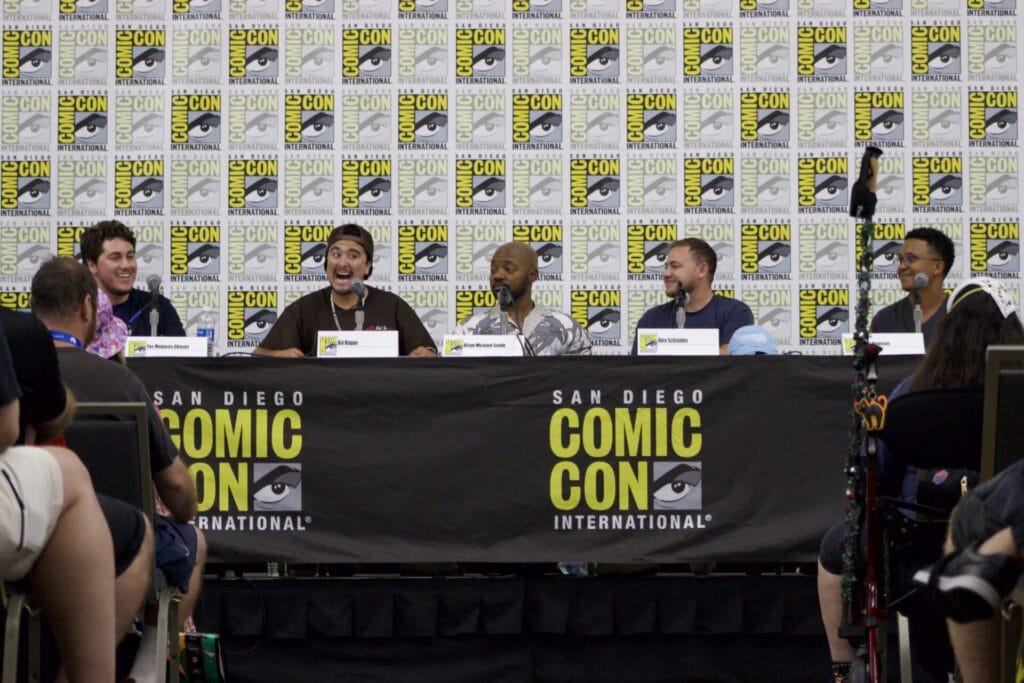This year at San Diego Comic Con, GLAAD had a robust presence at the annual conference dedicated to all things comics and related popular art, including movies, television, gaming interactive multimedia and much more.
To kick off the con, GLAAD joined IMDb at their Member-only IMDbPro Happy Hour, hosted annually on the fan-favorite boat. Over the past few years, GLAAD has worked closely with IMDb on enabling industry professionals to remove birthdates and birth names from its site while helping develop the ability for users to add demographic information to their profiles to be seen and found for entertainment opportunities. Read more here.

(Pictured, l-r: Nikki Santoro, IMDb COO, Alex Schmider, GLAAD Sr. Director of Entertainment & Transgender Inclusion, and Jennifer Pham-Hott, IMDbPro Head of Product)
That weekend, GLAAD partnered with actor Yas Modares Ghasiri on his traveling panel titled “Transmasculine Representation in Entertainment.” In the panel, which Ghasiri moderated, he noted that a year ago when he was attending this same conference to participate on a MENA representation panel, he noticed an absence of transmasculine voices across the conference. He recognized there was opportunity and took it upon himself to bring this to life over the course of the last year.
Featured on the panel were GLAAD’s Schmider, an Emmy-nominated film producer himself, actor Brian Michael Smith (FOX’s 9-1-1: Lone Star), actor Avi Roque (Disney’s The Owl House), and screenwriter Van Newman. The five discuss the history and impact of transmasculine representation, or the lack thereof, on them as people and creatives in the industry.

San Diego Comic-Con on July 27, 2024 in San Diego, California. (Photo by Gamal Darwish)
(Pictured, l-r: Yas Modares Ghasiri, Avi Roque, Brian Michael Smith, Alex Schmider, and Van Newman)
The panel invited each speaker to share how they have been impacted by the media they consumed growing up, and how that informs their individual creative pursuits. As representation of transmasculine characters have been minimal up until very recently, the panelists shared how they often resonated more with trans-coded characters like the Rowdyruff Boys (a set of superpowered children in the Cartoon Network show, The Powerpuff Girls, who were created as male versions of the titular heroines).
Some of the more explicit representation of trans men and transmasculine people in entertainment of the past, while memorable, also had positive and negative consequences.
Schmider noted:
“The film that we all keep mentioning for better or worse, Boys Don’t Cry was the first time I saw myself. And if you all know the film, it doesn’t present much of a hopeful future. It was the first time I ever saw someone that I related to in that way. And so it was deeply relieving to be like, “Oh, I am not the only person having this experience with my gender,” and it was also immensely terrifying. I was like, “Oh, if I become who I know that I am, then I will absolutely not have a future and my life will end violently and untimely. Seeing it actually delayed my own self-acceptance for about a decade. I saw that representation and it made me not want to pursue my own self-acceptance because I was afraid of what was going to happen if I did.”
Smith added:
“I talked about this in Disclosure that I saw a lot of people, movies like Just One of the Guys or Willy Nilly, where someone who is female bodied and identified as female decides that in order to access some kind of privilege or be taken serious, they’re going to pretend to be a boy to prove a point, but that’s not who they actually believe themselves to be. Then, at some point, the person gets revealed. That didn’t feel like my experience. So I just felt like I never really saw someone like me who just knew they were a boy. I think that’s what pushed me towards wanting to tell stories because I want to see that. I wish I had something like that where I could see someone who felt mistaken all their lives and became who they knew themselves to be.”
As the discussion transitioned from talking about the past to the present, each of the panelists were able to discuss their current experiences in the industry, including how they approached their most popular work.
Roque spoke about their experience recording for a cartoon series in a space where their coworkers were supportive and even adapted their character to more resemble them:
“I remember a moment where I was recording and there was someone who misgendered me, but then the voice director said, “Oh, they use they/them pronouns.” “Okay, great.” Then we moved on and then I could just do my work. So that was nice to have an ally in the room and just be able to focus on my work. That’s all I want is just to do my work, not have to worry about educating, not have to worry about doing all that, which I understand there are moments for that, but I have a choice to say yes and no to when I want to do that.”
About the way The Owl House also adapted the character of Raine to better reflect Roque:
“The real awesome thing was that the animators shaded Raine to my skin tone so now Raine is brown and I felt it was a moment where I got to inspire the character just by me being me. And then the animators got to take it and do with it as they will and what they did.”
Taking a step back and looking at the industry at large, Newman opined about the current environment and how it affects transgender storytelling:
“I think that streaming has put things in a very data-driven way where people are looking at numbers to justify what we should greenlight without listening to their soul or their spirit and thinking of what just feels right. And so in this data-driven world, in this world where we’re all recovering from the strike, folks are going for what feels like the safe bet. And I think that if they don’t see trans people on TV, then we are not the safe bet.”
Schmider added on this point: “It’s a risk to exclude us. Because if you look at the demographic data of audiences and consumers, GenZ, thank goodness for you all. It is the queerest, most ethnically and racially diverse generation in history. So when we’re talking about the authenticity of the worlds that these stories are showcasing and building, if it doesn’t look like the world we’re living in, is it really authentic? And I think we can start to talk about it as it’s a growth strategy. It truly is a risk for them not to be leaning into our community and the talent that is embedded within it.”
Newman added: “I do think that Baby Reindeer is indicative of that success. I think that was trusting someone who told a really authentic story on the most meta level ever seen. And the audience met that story where it was, and there’s a story that we can point to that says, “Yes, you can have a trans lead as playing character and how the biggest show on Netflix.” And that opens the door to say that’s not a risk anymore.”
As the panel concluded, each contributed about their hopes for the future of transmasculine representation in entertainment.
Schmider responded to the prompt:
“The reason I work at GLAAD and produce the work I do is so someone doesn’t have the experience I did with only having one piece of media that determines whether or not they can accept themself. I want to see more hopeful, joyful, full, big lives that look at us beyond transition, further along in our lives when we have gained a little bit of wisdom and we’re making different kinds of mistakes after fumbling through the inevitable adolescence that is having a new kind of experience in the world.”
Smith had also stated a lack of representation of older transmasculine people didn’t provide a vision for the future.
“All the stories that did start to come out about transmasculine people were usually about their early experiences and they were usually young. It was like I had no idea what was down the road, where were the 40 and 50-year-old trans men, what were they doing and what could the future look like?”
Newman poignantly brought up:
“I don’t think that we should be inclusive for inclusivity’s sake, but I do think that we should all look around and ask ourselves, “Who is the company that we keep?” And I think especially in the industry where it can be very easy to look around and realize that everyone maybe looks like you.”
Thanks to Ghasiri and all of the panelists showing up as who they are and what they contribute to entertainment,this provides a more broad kind of representation at San Diego Comic-Con than was before.
Anecdotes from panelists included Smith reflecting on his time meeting Oprah and sharing sliders together, Schmider revealed a fun fan fact about Degrassi’s character Adam who was named after GLAAD’s Nick Adams, VP of the GLAAD Media Institute, Roque shared more about their entry into voice and narration work beginning with the book Cemetery Boys, and Newman cited GLAAD’s Where We Are on TV Report and Studio Responsibility Index as north stars for referencing in their writing and becoming a showrunner while he teased his first feature, which is a psychological thrilled trans coming-of-age story with Trevor Noah’s production company, Day Zero.
To cap off the weekend, panelists attended the Entertainment Weekly Comic-Con Bash to celebrate their inclusion in the convention and industry.













